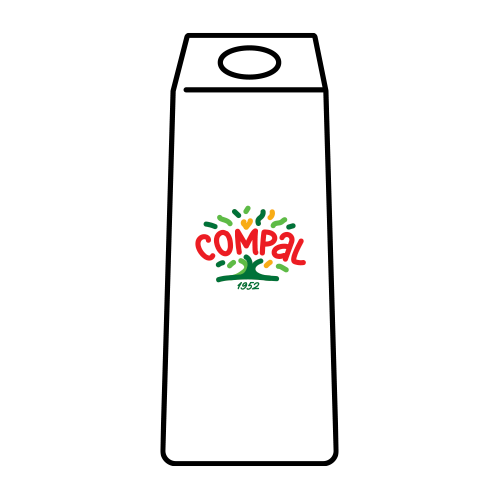
Tetra Pak 1L
INGREDIENTS AND ALLERGENS
Ingredients
Water, passion fruit juice: made from concentrate, sugar, acidity regulator: citric acid and ascorbic acid (vitamin C).
Conservation conditions
Once opened, store in a refrigerator.
Other information
Fruit content: at least 25%.
NUTRITIONAL TABLE
Nutritional info per 100 ml
| Energy | 235kJ - 55kcal |
| Lipids | <0,5g |
| - of which saturated | <0,1g |
| Carbohydrates | 14g |
| - of which sugars | 13g |
| Fibre | - |
| Proteins | <0,5g |
| Salt | <0,01g |
| Vitamin C | 6mg (7,5% VRN*) |
* Nutrient Reference Value
Other Flavours
JUICES & NECTARES
QUESTIONS AND CURIOSITIES
What is the difference between nectar and a 100% juice?
Both are drinks with a high fruit content and that's what distinguishes them from soft drinks and water.
Nectar can have between 25 and 99% of fruit, with the minimum legal limits defined depending on the type of fruit. For example, the minimum fruit threshold for peach nectar is 50%, while that for mango nectar is 25%.
100% juices are those that consist only of fruit juice, with no added water.
If Juices & Nectars have no preservatives, how do they keep for so long without spoiling?
Juices and Nectars don't go bad thanks to a technique called pasteurization, which consists of a heat treatment given to the juice, which allows it to keep for longer, keeping the naturalness of a fruit juice squeezed at home.
And do the nectars still have added sugar?
Yes, but the sugar content remains unchanged. However, we use sugar at low levels and only to improve its taste. In recent years we have been reducing the sugar levels in our nectars to make them even healthier.
Is there a maximum consumption limit for fruit juices?
First of all, it should be emphasized that Compal juices and nectars are made essentially from fruit, a food that is beneficial to health and whose low consumption is pointed out by the World Health Organization as one of the main causes of health problems.
When we talk about limits, we cannot say that there is a defined maximum consumption pattern, since each person has their own health status, and metabolisms differ a lot between individuals. This question should always be posed within a specific case, not a generic one, so these questions should be addressed to the family doctor, who will be the most qualified person to know the clinical condition of the person in question, and if this same clinical condition imposes limits on the consumption of certain foods.




